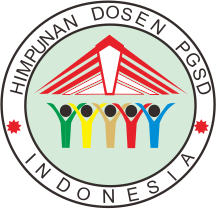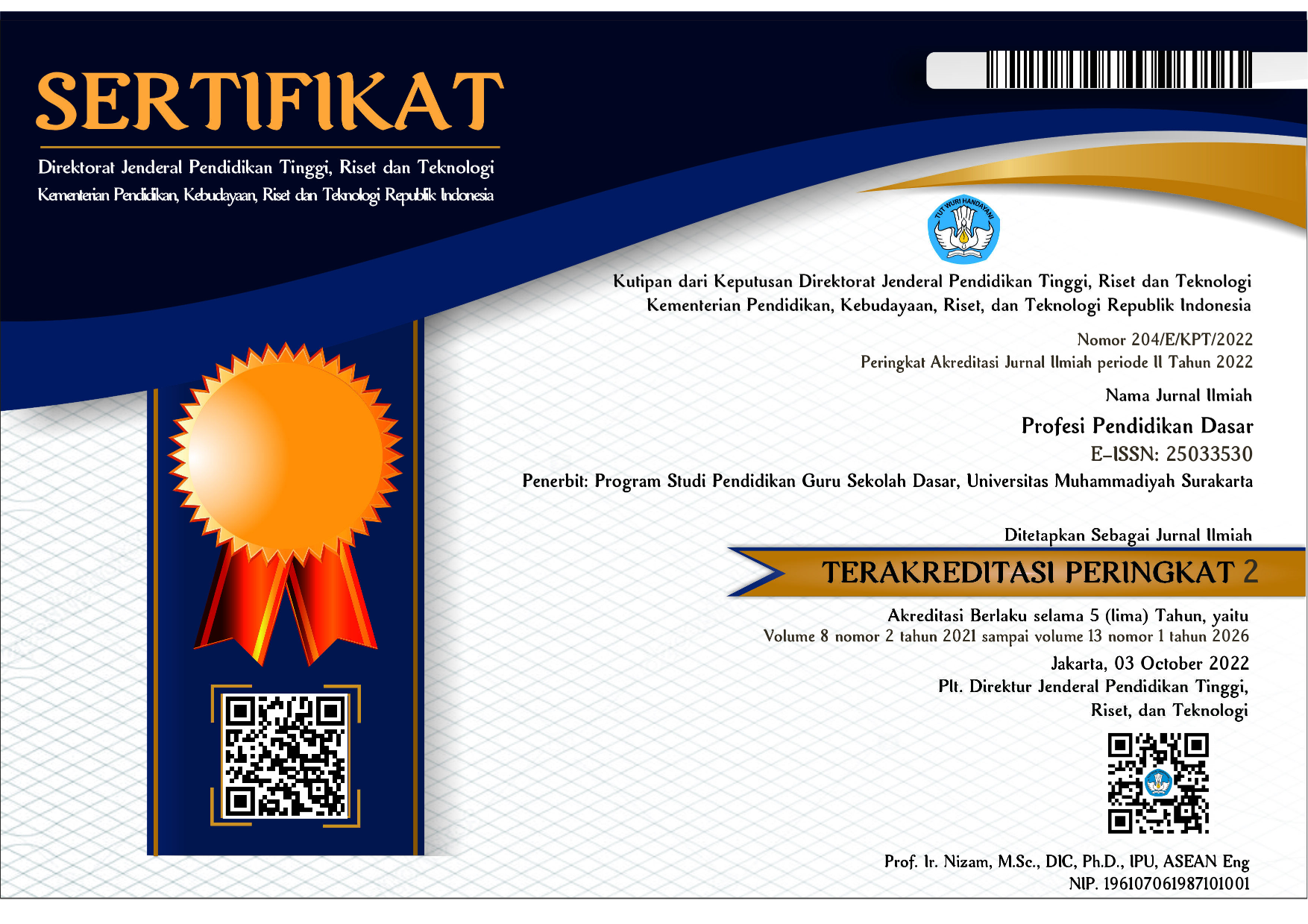IMPLEMENTASI MODEL PEMBELAJARAN “BERKAT ANANG” DI KALANGAN SISWA PENDIDIKAN DASAR BERBUDAYA JAWA
Fitri Puji Rahmawati(1*), Muhroji Muhroji(2), Ratnasari Diah Utami(3)(1)
(2)
(3)
(*) Corresponding Author
Abstract
elementary school environment learners Javanese culture. The specific objective of the
second year is to formulate a model of an active character education and fun in the
elementary school students then tested the cultured Javanese character education model
that is active and fun in the cultured primary school learners Java. The main method
developed in this research is descriptive - qualitative - reflective. The research method will
be implemented in the second year is the collection of data with focus group discussions
involving teachers, principals, school committees , and parents / guardians of students .
The collected data were analyzed by using a reflective critique. In that year also applied
data collection methods to test the model. The data were analyzed with a heuristic model.
This study has several performance indicators of each year. After the first year the indicator
is reached, followed by a search for examples of learning models applied by the teacher
in the implementation of character education. Year two indicators to be achieved is the
strong foundation of character education in the elementary sense after FGD with teachers,
principals, school committee, and parents / guardians of students. This indicator will
explain: (1) the weaknesses and strengths of the old model of learning in the teaching of
character education, (2) the expectations of elementary education stakeholders about
character education , (3) application of learning models “ Thanks Sam “ in SD and the
surrounding region of Surakarta , (4) the power of learning model “ Thanks Sam “ as a
learning model that is able to strengthen the character of elementary school students .
.
Keywords
Full Text:
PDFReferences
Ary, Donald. 1982. Pengantar Penelitian dalam Pendidikan. (Terjemahan Arief Furchan).
Surabaya: Usaha Nasional.
Hartono. 2008. Strategi Pembelajaran Active Learning (www. Strategi Pembelajaran Active
Learning « Membina Generasi Rabbani.Htm, tgl 5 Juni 2010).
Hernowo. 2007. Menjadi Guru yang Mau dan Mampu Mengajar secara Menyenangkan.
Bandung: Penerbit MLC.
Lickona, T. 1991. Educating for character, how our school can teach respect and responsibility.
New York: Bantam Books
Lie, Anita. 2007. Cooperative Learning: Mempraktikkan Cooperative Learning di Ruang-ruang
Kelas. Jakarta: Grasindo.
Marzuki, M. Murdiono, Samsuri. 2011. “Pembinaan Karakter Siswa berbasis Pendidikan Agama di
SD dan SMP di DIY”, dalam JURNAL KEPENDIDIKAN, Volume 41, Nomor 1, Mei
, hal. 71-86
Megawangi, Ratna, Dkk. 2005. Pendidikan yang Patut dan Menyenangkan. Jakarta Pusat: Viscom
Pratama.
Miles, M.B. & Huberman, A.M. 1984. Qualitative Data Analisys: A Source Book of New Methods.
Beverly Hills, CA: Sage Publications
Moleong, Lexy.J. 1990. Metode Penelitian Kualitatif. Bandung: Remaja Rosda Karya.
Mulyasa, E., Kurikulum Berbasis Kompetensi (KBK), Konsep, Karakteristik dan Implementasi,
Bandung, Remaja Rosdakarya, 2004.
Pardjono. 2010. Pendidikan Karakter di Indonesia: Konsep dan Implementasinya, Makalah ini
disampaikan pada saat Seminar Nasional “Revitalisasi Pendidikan Karakter dalam
Membangun Bangsa” pada tanggal 16 Mei 2010.
Sjarkawi. 2006. Pembentukan Kepribadian Anak: Peran Moral, Intelektual, Emosional, dan
Sosial sebagai Wujud Integritas Membangun Jati Diri. Jakarta: Bumi Aksara.
Article Metrics
Abstract view(s): 418 time(s)PDF: 361 time(s)
Refbacks
- There are currently no refbacks.


















